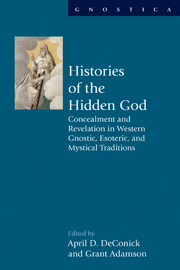 Histories of the Hidden God
Histories of the Hidden God Book contents
- Frontmatter
- Contents
- Acknowledgments
- Contributors
- Introduction: In search of the hidden God
- Part I Concealment of the Hidden God
- Part II The Human Quest for the Hidden God
- 6 Obscured by the scriptures, revealed by the prophets: God in the Pseudo-Clementine Homilies
- 7 How hidden was God? Revelation and pedagogy in ancient and medieval Hermetic writings
- 8 From hidden to revealed in Sethian revelation, ritual, and protology
- 9 Shamanism and the hidden history of modern Kabbalah
- 10 Dreaming of paradise: Seeing the hidden God in Islam
- Part III Revelations of the Hidden God
- Afterword: Mysticism, Gnosticism, and esotericism as entangled discourses
- Bibliography
- Index
10 - Dreaming of paradise: Seeing the hidden God in Islam
from Part II - The Human Quest for the Hidden God
- Frontmatter
- Contents
- Acknowledgments
- Contributors
- Introduction: In search of the hidden God
- Part I Concealment of the Hidden God
- Part II The Human Quest for the Hidden God
- 6 Obscured by the scriptures, revealed by the prophets: God in the Pseudo-Clementine Homilies
- 7 How hidden was God? Revelation and pedagogy in ancient and medieval Hermetic writings
- 8 From hidden to revealed in Sethian revelation, ritual, and protology
- 9 Shamanism and the hidden history of modern Kabbalah
- 10 Dreaming of paradise: Seeing the hidden God in Islam
- Part III Revelations of the Hidden God
- Afterword: Mysticism, Gnosticism, and esotericism as entangled discourses
- Bibliography
- Index
Summary
As Gustave von Grunebaum stated some forty years ago in The Dream and Human Societies, dreaming and the extensive recording of dreams is emblematic of classical Muslim societies. When revelation had ceased with the death of the Prophet Muhammad dreams and dreaming became increasingly more important within Islam. Indeed, it is said that the “true” dream constitutes one forty-sixth part of prophecy. While the art and science of dream interpretation has attracted a good deal of attention during the recent past, most notably in the work of John Lamoreaux, the extensive work of Leah Kinberg and, for the later Sufi tradition, Jonathan Katz, no one has taken up von Grunebaum's challenge and actually examined the Muslim historical and biographical literature to see what dreams Muslims recorded and how they interpreted them.
The material in the historical, adab (fine literature), biographical, and geographical literature is vast and records thousands upon thousands of dreams. (The database upon which I will base my research contains as yet approximately 3,200 dreams, which is most likely only a small selection of what is truly available.) This practical manifestation of the Muslim interest in dreams was alluded to by von Grunebaum, who summarized a random number of themes from it, without making any attempt to categorize or summarize the whole. However, this material is of the highest interest, because it represents not the idealized form of Muslim dream interpretation as is to be found in the numerous treatises on the subject (see Lamoreaux 2002), but the actual raw material of the dreams and their on-the-spot interpretation.
- Type
- Chapter
- Information
- Histories of the Hidden GodConcealment and Revelation in Western Gnostic, Esoteric, and Mystical Traditions, pp. 193 - 204Publisher: Acumen PublishingPrint publication year: 2013
